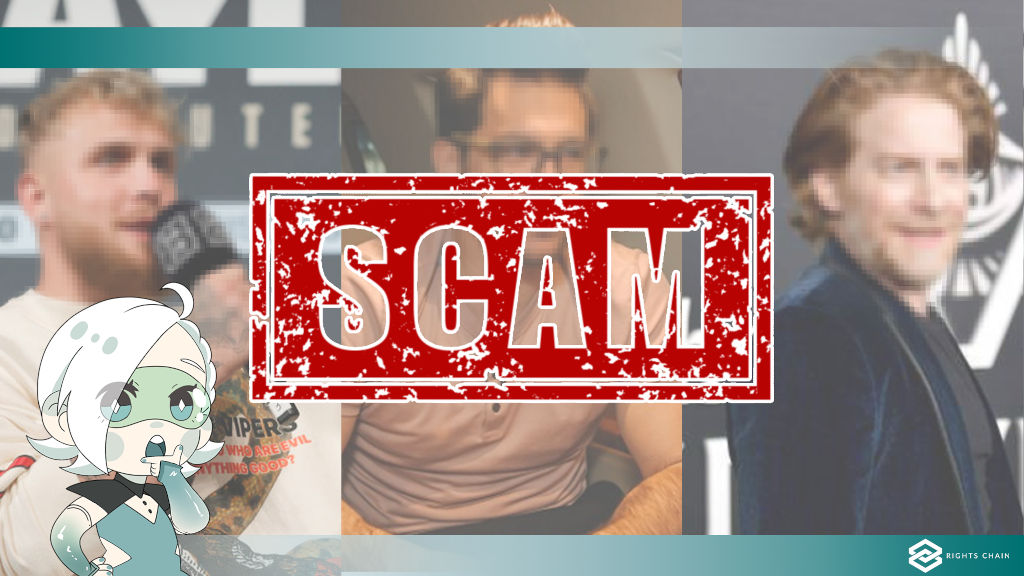Influencers and Reputation: would you compromise your reputation to promote a fraud?

- 2022-08-31
- Yako
- Creators
An influencer is, by definition, a successful personality, popular on social networks and generally well followed by the media, who is able to influence the behaviour and choices of a given audience. This last point requires particular attention, as it demonstrates the power in the hands of some prominent personalities: most tend to misuse it, even going as far as legal issues and accusations of fraud, but which unfortunately often do not lead to real consequences.
Animoon
This is the case of Jake Paul, an American youtuber who, in addition to having received various legal charges, participated in and publicised the NFT project 'Animoon'. Disappeared from social platforms just last month, Animoon was supposed to be a P2E (pay-to-earn) game, based on the purchase of NFT (non-fungible tokens) in the form of virtual cards. The latter would have included 15 legendary cards that promised to earn $2,500 per month forever, until the end of their existence. Pretending to have a partnership directly with Pokèmon, as the illustrations on the cards looked like very low quality recolourations of the mascots we all know, the creators of Animoon promised comics, a secret project with Netflix and international giveaways - only to carry out yet another rug pull: a way to pump up the value of the token or cyptocurrency, creating excitement about it, but selling everything before the price collapses to zero. By deleting the site, twitter account and discord server, the project team stole $6.3 million from its investors; without ever having undertaken the development of the originally promised game.
Pixelmon
Staying along the lines of the Pokèmon franchise, we can then talk about 'Pixelmon', touted as the greatest NFT game that has ever existed and will ever exist. In essence, it is an open-world RPG in the Metaverse, in which you train, trade and evolve your Pixelmon. The game's demo was a huge success, prompting investors to support the project and raising over 70 million dollars. By minting (i.e. creating the tokens in the blockchain) NFTs, those who supported the project were supposed to actually receive Pixelmon, little beings to be used in the game. It did not go exactly as planned: one customer received nothing but a patch of grass.
It was later discovered that the team behind this project did not actually exist, it was just a 21-year-old with no game design experience whatsoever. To be fair, the latter later explained that 'Pixelmon' would be developed in conjunction with the entertainment studio Magic Media. All's well that ends well, right?
It would be so, if it were not for the fact that the creator of Pixelmon collaborated with some freelance artists at the beginning of the project, commissioning them to make changes to some Unity assets, and then put them into the game demo. In addition, the project leader decided to commission promotional material for Pixelmon from some artists on Fiverr - the artists involved were never informed that their work would be included in an NFT project.
Copyrights and digital theft
One begins to see a pattern within these projects: in one way or another, the artistic division suffers, whether it is because artists are unaware of their works being transformed into NFT, or because copyrighted works are being used but deliberately modified. The harm this practice causes is considerable, especially when it comes to creators with a small following, as they often lack the measures to protect themselves. The prospect of participating in an NFT project, and thus theoretically being able to earn something extra from one's art, is rightly very tempting; but the consequences of this decision can be much more serious than expected. A large number of artists have experienced this kind of situation first hand, spending time, resources and dedication on a project, without receiving either payment for their work or recognition for their participation. Scams, frauds and scams are now the order of the day in the cryptocurrency world.
Seth Green and Bored Ape Yacht Club
A curious case is that of Seth Green. The American producer had originally announced his own project dedicated to an animation concerning the NFT universe, using as the main character the figure called 'Bored Ape', member number #8398 of a world-famous NFT collection. The actor recounts that, a few days before the convention, the main character himself - the 'Bored Ape' in his possession - was stolen. Investigations revealed that the NFT was bought by user @DarkWing84, alias a collector known as Mr.Cheese. Fortunately, good news arrived in early June, announcing that Bored Ape #8398 was back in the hands of its original owner, Seth Green.
Tai Lopez
There are also those who approach the NFT topic with different methods, such as the American entrepreneur and influencer Tai Lopez, who opted for the creation of 'utility' NFTs. The latter, in contrast to the digital artistic works of great renown in recent times, are a kind of pass for a chance to experience things with Tai Lopez himself: be it watching a film or playing basketball. Moreover, his big invention lies in 'The Original Garage Social Club' project: divided into 3 different tiers, it offers specific courses and an exclusive membership to a hotel, a restaurant and a club created especially for the buyers of the NFT in question.
Unfortunately for Tai, the project's investors were only around 500 people, theoretically forcing Mr. Lopez to build a hotel, restaurant and club only for a small number of customers. An influencer seems to have stumbled upon the consequences of his actions, however minimal.
OpenSea & Inside Trading
Nevertheless, there have been specific events in the past that have affected the NFT and cryptocurrency world, especially because of the people involved. Nate Chastain, the executive of the NFT trading platform 'OpenSea', was accused of wire fraud and money laundering as a result of an insider trading scheme. Every time an NFT was launched on the platform and its value exploded, Chastain would trade before it could reach OpenSea's customers, thus securing huge profits. This shows that consequences sooner or later reach those involved, but it seems that when it comes to 'high-ranking' influencers, this happens more later than before.
Due to such projects, the image of the possible influencers involved could be completely jeopardised: participating in such initiatives requires putting oneself on the line, even if it does not mean that the results will be positive. The reputation of the participating online personalities is obviously at risk of being ruined, whether it is by the use of such a controversial currency as Ethereum or NFTs, or whether it is by the misuse of others' work. Those who are usually negatively affected by this are the artists - which is why the creators of such projects should make it clear from the outset that their work will be used in such initiatives, thus leaving the choice of whether or not to participate to the artist involved.
What should be done then?
Content creators or influencers often receive opportunities to collaborate or promote products, projects or initiatives for a fee. It represents a source of income for the creator and there is nothing wrong with that, however with the increase of crypto-based initiatives, NFT or even innovative start-ups, the risk of damaging one's reputation increases. Our suggestion is to either do a review of the project to understand its quality and validity before promoting it or, because mistakes can always happen, have a plan to clean up the mess should it occur.
Can we help you?
Do you have questions or curiosity about this article? Have you ever encountered a situation that you didn't know exactly how to approach? Contact us without obligation to share your experience or to request our support.
References
- https://beincrypto.com/jake-paul-promotes-yet-another-nft-rug-pull-founders-make-off-with-6-3m/
- https://beincrypto.com/learn/pixelmon-nft/
- https://robbreport.com/shelter/art-collectibles/13-5-million-bored-ape-yacht-club-nfts-stolen-1234744495/
- https://www.youtube.com/watch?v=jeyKedqQCHw
- https://sg.news.yahoo.com/ex-coinbase-product-manager-charged-with-insider-trading-172802636.html
